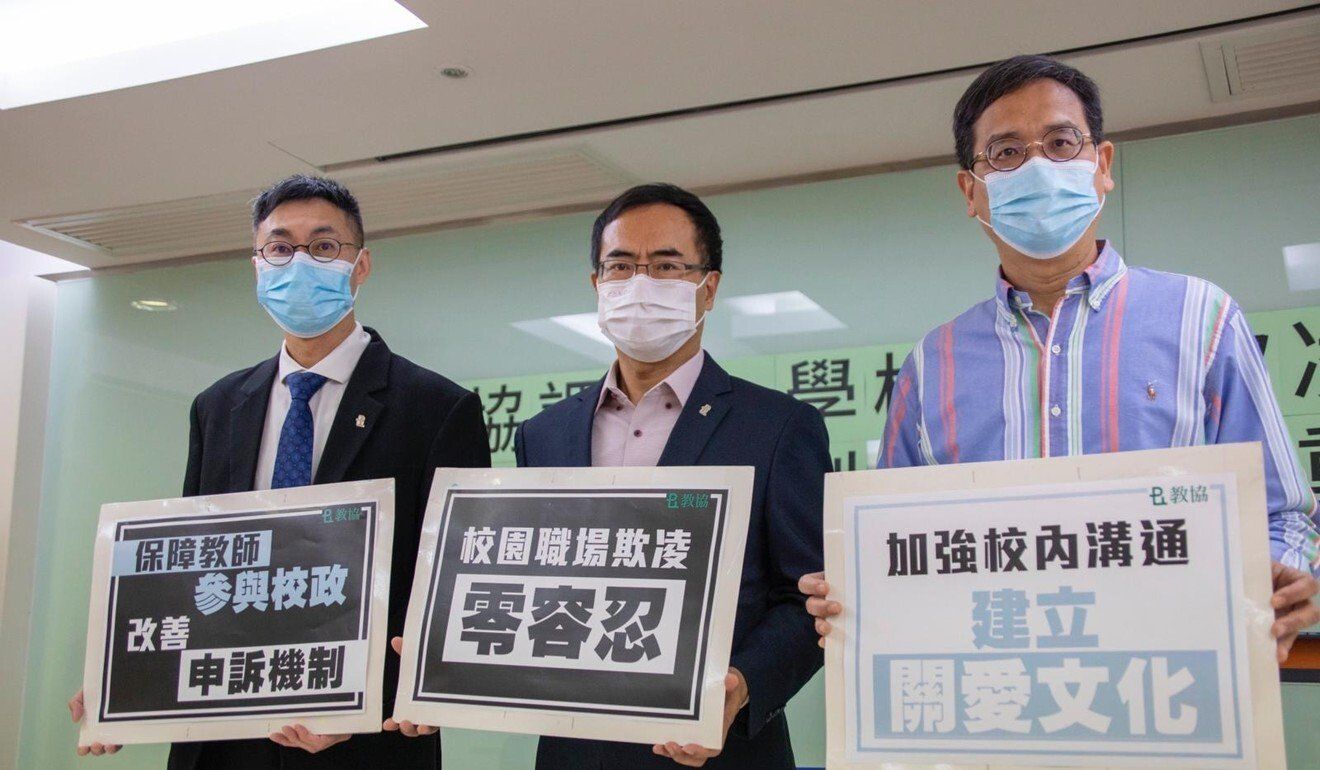Hong Kong News

Over half of Hong Kong teachers bullied at work in past six months
More than half the 1,200 Hong Kong teachers polled in a new survey said they had been bullied by colleagues in the past six months, although many were reluctant to speak out, prompting the city’s biggest educators’ union to call for legislation to better protect them.
The findings released by the Professional Teachers’ Union (PTU) on Tuesday also found that over 70 per cent of teachers lacked confidence in the ability of schools’ existing complaint mechanisms to appropriately handle their situations.
The findings came just a month after a coroner ruled a primary schoolteacher had been driven to suicide two years ago by the principal who repeatedly shamed her and pressured her to resign. An inadequate complaint mechanism was specified as a contributing factor.
 The Professional Teachers’ Union released the results of a survey on
Tuesday detailing widespread bullying of educators by their colleagues.
The Professional Teachers’ Union released the results of a survey on
Tuesday detailing widespread bullying of educators by their colleagues.
Teacher Lam Lai-tong’s death in March 2019 sparked a public outcry that led to headmistress Law Yuen-yee being sacked five months later, and educators and union leaders calling for changes in the complaint process.
“Workplace bullying is a serious problem at schools,” Fung Wai-wah, president of the 100,000-strong PTU, said at a press conference unveiling the study.
“Under an imbalance of power, especially for temporary teachers or staff on [fixed-term] contracts, many are afraid to speak out even when they witness their colleagues being bullied.”
The survey, conducted between late February and early March, polled 1,283 educators, including 657 primary schoolteachers and 544 from secondary schools. A majority of the respondents were frontline teachers, though about a fifth were vice-principals or from the ranks of middle management.
More than 53 per cent of teachers said they had encountered workplace bullying – defined by the union as an abuse of power or unfair treatment through repeated insults, isolation or threats – at least once in the past six months. About 25 per cent said they were being bullied at work at least once a month on average.
While the survey did not ask teachers to detail their experiences, Fung said: “Many cases we encountered involved teachers being asked to amend and submit reports at work over and over again as their [supervisors] expressed disapproval, making them feel dejected, as they did not know what they had done wrong.”
Some 71 per cent of teachers, meanwhile, “disagreed” or “strongly disagreed” that existing mechanisms allowed them to express their concerns freely, while more than 56 per cent said they did not know how to voice complaints when confronted by unfair treatment.
The union also urged the government to consider regulating workplace bullying at schools – something supported by 86 per cent of poll respondents – including introducing legislation that could place vicarious liability on school management.
Under existing mechanisms, teachers can file complaints about workplace bullying to their schools, internal management committees or sponsoring bodies, or directly to the Education Bureau.
Teachers may also appeal the bureau’s decision if they disagree with investigation results. But data provided by the bureau showed no teachers had filed an appeal under the system over the past year.
Without commenting on the calls for legislation, a bureau spokeswoman said in a reply that it would enhance support for schools that lacked good governance, while reminding them to foster workplace environments with respect and harmony as required by existing regulations.











